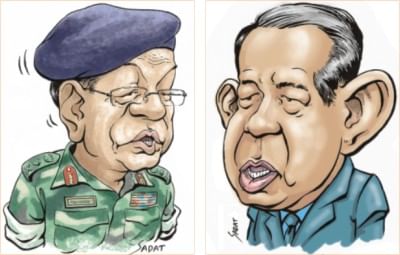Keep DGFI away from politics

A parliamentary body yesterday placed in the House a special report on the 2007 Dhaka University campus violence, recommending steps to put an end to the DGFI's meddling in politics, and closing the interrogation cells of the task force and joint forces.
“Common people and politicians are tortured in these cells, which can't continue in any civilised and democratic country,” noted the parliamentary standing committee on education ministry in its report.
The House body, however, suggested measures to improve relations between the civil and military administration and reduce the gap between the two through issuing a new warrant of precedence, giving public representatives precedence over any of the forces.
It also held former caretaker government adviser Fakhruddin Ahmed, former army chief Gen (retd) Moeen U Ahmed, Maj Gen (retd) ATM Amin, Brig Gen (retd) Fazlul Bari, Col (retd) Shamsul Alam, and former police chief Nur Mohammad responsible for “inhuman torture" on teachers and students during the campus unrest and recommended bringing them to book under existing laws.
“The incident [the violence] was not only unwarranted, but also disgraceful and unfortunate for the entire nation. It's vital to take action to prevent a recurrence of such incidents,” the report observed.
The committee found in its investigation that some army officers had deliberately disregarded the civil administration, and accused the Directorate General of Forces Intelligence (DGFI), the main military intelligence agency of the country, of “excesses” at the time.
“The DGFI and some army officers committed offences by torturing teachers and students, which are not pardonable,” says the report.
On August 20, 2007, during the period of the caretaker government under the state of emergency, a few army officers beat up three Dhaka University students and insulted a DU teacher during a football match on DU's gymnasium ground.
Following the incident, thousands of DU students took to the streets demanding an apology from the troops and withdrawal of the army camp, which had been set up on the campus after the declaration of emergency without the permission of the DU authorities.
As violence spread to other campuses across the country in the days that followed, the government imposed a curfew in the divisional headquarters and shut down all public universities and colleges on August 22.
Four teachers and eight students were arrested and kept behind bars for around five months while a thousand others were allegedly tortured on the campuses and also in other places across the country.
The detained teachers and students were eventually released in January 2008.
After the Awami League-led alliance formed the government through the December 2008 elections, its House body on education ministry in August 2010 formed a four-member sub-committee to probe the violence.
Rashed Khan Menon, chief of the parliamentary body, placed the 383-page report in the House yesterday.
COMMITTEE'S OBSERVATION
In its report the committee observed that the violence was inevitable against the backdrop of “efforts to establish martial law” in the country in the name of state of emergency at the time.
“Excessive interference in the university's internal matters by the DGFI, Rab, police and other forces were one of the main reasons behind the incident,” the report said, adding, “The incident would have been avoided had the DGFI, Rab and police not had the mindset to disregard the civil administration.”
Citing statements of the then education adviser Ayub Quadri, the report said it was evident that some army officers had interfered in the activities of the then caretaker government.
“The education adviser said [at a sub-committee meeting] in the wake of the campus unrest that the council of advisers at an urgent meeting made four decisions, including seeking apology for the incident, withdrawing the army camps, forming a judicial commission to probe the matter and punishing the individuals responsible for the incident,” reads the report, “but some DGFI officials appeared at the meeting suddenly and opposed the decisions and pressurized the council into not keeping any record of the decisions."
OTHER RECOMMENDATIONS
Among other recommendations are withdrawal of all cases filed against teachers, students and others over the violence and realising money from the persons responsible for the atrocities to compensate the injured teachers and students for their treatment.
It asked the government to recompense the family of a rickshaw puller who died at the Rajshahi University campus during the violence.
In future, the army will have to take permission from the university authorities for setting up camps on the campus, the report said.
The committee also recommended the enactment of a law making it mandatory for individuals to appear before the parliamentary bodies for giving testimonies.

 For all latest news, follow The Daily Star's Google News channel.
For all latest news, follow The Daily Star's Google News channel. 



Comments